Business Law: Director's Duties, Corporate Governance, and Section 181
VerifiedAdded on 2022/12/23
|13
|3279
|37
Report
AI Summary
This report analyzes the duties of company directors in Australia, focusing on the concepts of 'good faith' and 'proper purpose' as defined in Section 181 of the Corporations Act 2001. It explores the meaning of these terms, drawing on relevant case law, and examines their significance in corporate governance. The report discusses the fiduciary duties of directors, the consequences of breaching these duties, and the statutory mechanisms that facilitate good corporate governance. It highlights the importance of directors acting honestly, fairly, and for the benefit of the company, and how the courts determine whether a director has acted in accordance with these principles. The report also touches upon the role of the Australian Securities and Investments Commission (ASIC) in enforcing these duties and ensuring compliance with the law. Overall, the report provides a detailed overview of the legal framework governing director's duties and corporate governance in Australia, offering valuable insights into the responsibilities and obligations of company directors.

Running Head: BUSINESS LAW 0
[School]
[Course title]
Corporation law
AUSTRALIA
[School]
[Course title]
Corporation law
AUSTRALIA
Paraphrase This Document
Need a fresh take? Get an instant paraphrase of this document with our AI Paraphraser

BUSINESS LAW 1
Table of Contents
Introduction....................................................................................................................................2
Good Faith......................................................................................................................................2
Proper purpose...............................................................................................................................3
Meaning of Fiduciary Duty...........................................................................................................4
Section 181 along with good faith and proper purpose..............................................................4
Statutory mechanism which can facilitate corporate governance............................................6
Conclusion......................................................................................................................................7
Bibliography...................................................................................................................................8
Table of Contents
Introduction....................................................................................................................................2
Good Faith......................................................................................................................................2
Proper purpose...............................................................................................................................3
Meaning of Fiduciary Duty...........................................................................................................4
Section 181 along with good faith and proper purpose..............................................................4
Statutory mechanism which can facilitate corporate governance............................................6
Conclusion......................................................................................................................................7
Bibliography...................................................................................................................................8
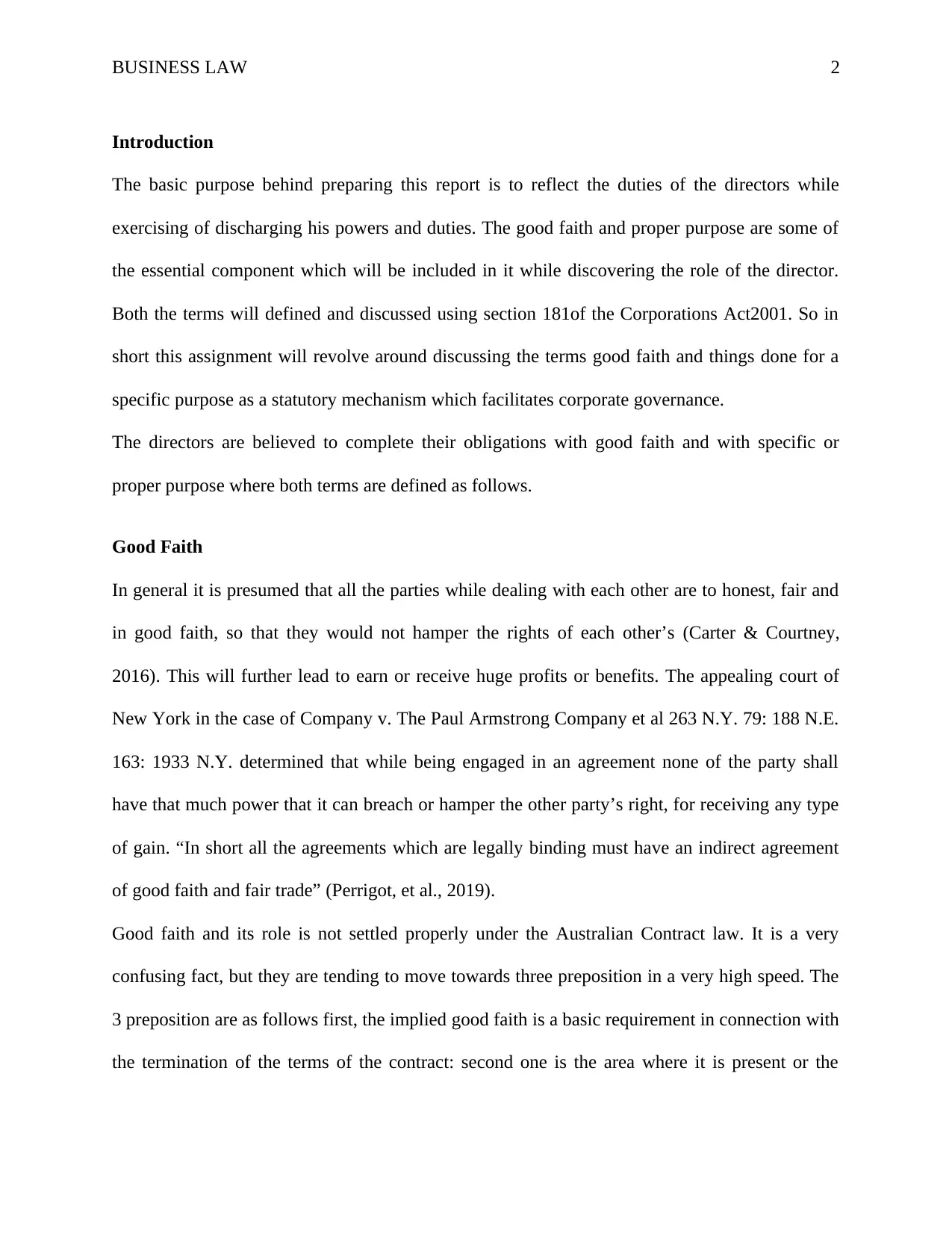
BUSINESS LAW 2
Introduction
The basic purpose behind preparing this report is to reflect the duties of the directors while
exercising of discharging his powers and duties. The good faith and proper purpose are some of
the essential component which will be included in it while discovering the role of the director.
Both the terms will defined and discussed using section 181of the Corporations Act2001. So in
short this assignment will revolve around discussing the terms good faith and things done for a
specific purpose as a statutory mechanism which facilitates corporate governance.
The directors are believed to complete their obligations with good faith and with specific or
proper purpose where both terms are defined as follows.
Good Faith
In general it is presumed that all the parties while dealing with each other are to honest, fair and
in good faith, so that they would not hamper the rights of each other’s (Carter & Courtney,
2016). This will further lead to earn or receive huge profits or benefits. The appealing court of
New York in the case of Company v. The Paul Armstrong Company et al 263 N.Y. 79: 188 N.E.
163: 1933 N.Y. determined that while being engaged in an agreement none of the party shall
have that much power that it can breach or hamper the other party’s right, for receiving any type
of gain. “In short all the agreements which are legally binding must have an indirect agreement
of good faith and fair trade” (Perrigot, et al., 2019).
Good faith and its role is not settled properly under the Australian Contract law. It is a very
confusing fact, but they are tending to move towards three preposition in a very high speed. The
3 preposition are as follows first, the implied good faith is a basic requirement in connection with
the termination of the terms of the contract: second one is the area where it is present or the
Introduction
The basic purpose behind preparing this report is to reflect the duties of the directors while
exercising of discharging his powers and duties. The good faith and proper purpose are some of
the essential component which will be included in it while discovering the role of the director.
Both the terms will defined and discussed using section 181of the Corporations Act2001. So in
short this assignment will revolve around discussing the terms good faith and things done for a
specific purpose as a statutory mechanism which facilitates corporate governance.
The directors are believed to complete their obligations with good faith and with specific or
proper purpose where both terms are defined as follows.
Good Faith
In general it is presumed that all the parties while dealing with each other are to honest, fair and
in good faith, so that they would not hamper the rights of each other’s (Carter & Courtney,
2016). This will further lead to earn or receive huge profits or benefits. The appealing court of
New York in the case of Company v. The Paul Armstrong Company et al 263 N.Y. 79: 188 N.E.
163: 1933 N.Y. determined that while being engaged in an agreement none of the party shall
have that much power that it can breach or hamper the other party’s right, for receiving any type
of gain. “In short all the agreements which are legally binding must have an indirect agreement
of good faith and fair trade” (Perrigot, et al., 2019).
Good faith and its role is not settled properly under the Australian Contract law. It is a very
confusing fact, but they are tending to move towards three preposition in a very high speed. The
3 preposition are as follows first, the implied good faith is a basic requirement in connection with
the termination of the terms of the contract: second one is the area where it is present or the
⊘ This is a preview!⊘
Do you want full access?
Subscribe today to unlock all pages.

Trusted by 1+ million students worldwide
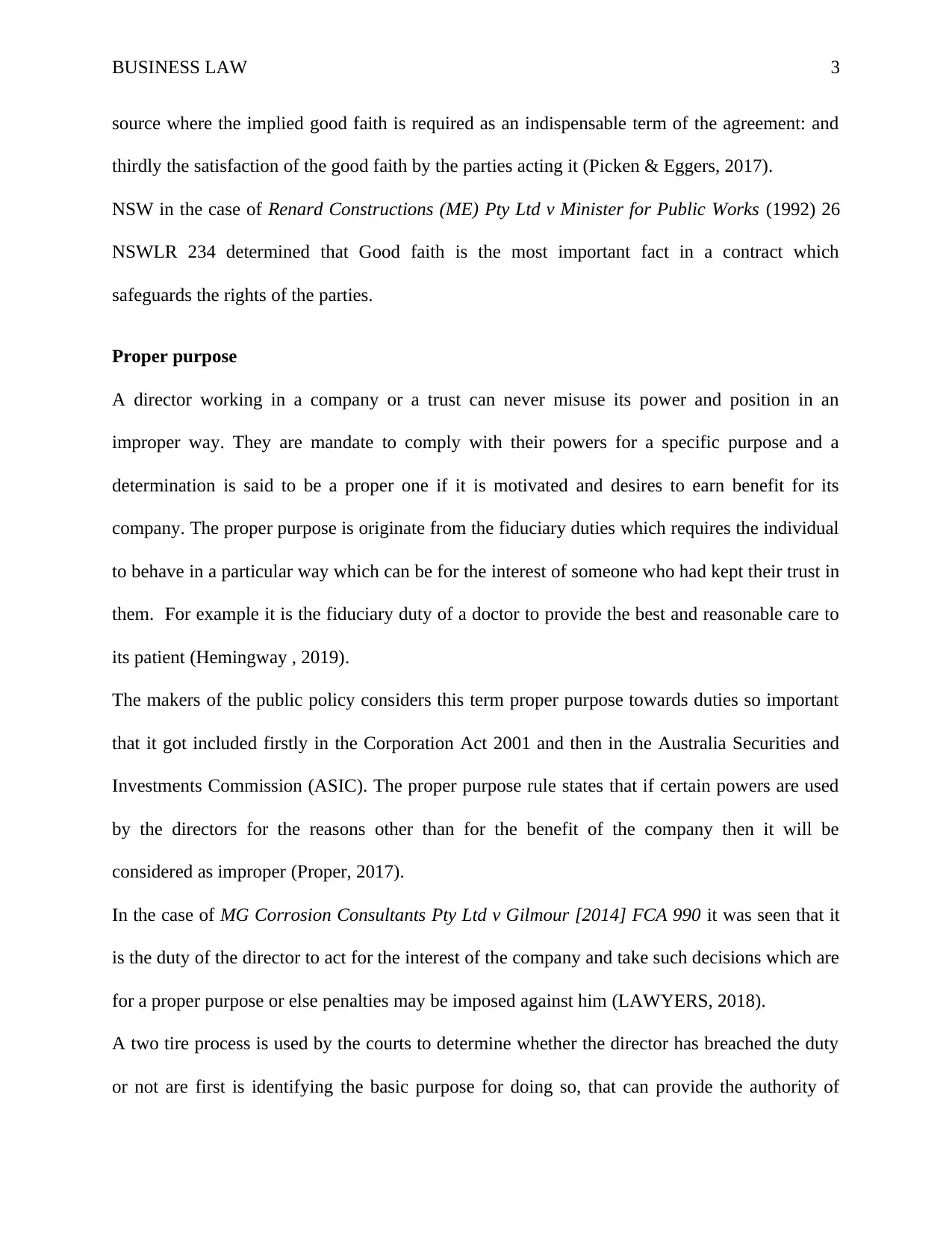
BUSINESS LAW 3
source where the implied good faith is required as an indispensable term of the agreement: and
thirdly the satisfaction of the good faith by the parties acting it (Picken & Eggers, 2017).
NSW in the case of Renard Constructions (ME) Pty Ltd v Minister for Public Works (1992) 26
NSWLR 234 determined that Good faith is the most important fact in a contract which
safeguards the rights of the parties.
Proper purpose
A director working in a company or a trust can never misuse its power and position in an
improper way. They are mandate to comply with their powers for a specific purpose and a
determination is said to be a proper one if it is motivated and desires to earn benefit for its
company. The proper purpose is originate from the fiduciary duties which requires the individual
to behave in a particular way which can be for the interest of someone who had kept their trust in
them. For example it is the fiduciary duty of a doctor to provide the best and reasonable care to
its patient (Hemingway , 2019).
The makers of the public policy considers this term proper purpose towards duties so important
that it got included firstly in the Corporation Act 2001 and then in the Australia Securities and
Investments Commission (ASIC). The proper purpose rule states that if certain powers are used
by the directors for the reasons other than for the benefit of the company then it will be
considered as improper (Proper, 2017).
In the case of MG Corrosion Consultants Pty Ltd v Gilmour [2014] FCA 990 it was seen that it
is the duty of the director to act for the interest of the company and take such decisions which are
for a proper purpose or else penalties may be imposed against him (LAWYERS, 2018).
A two tire process is used by the courts to determine whether the director has breached the duty
or not are first is identifying the basic purpose for doing so, that can provide the authority of
source where the implied good faith is required as an indispensable term of the agreement: and
thirdly the satisfaction of the good faith by the parties acting it (Picken & Eggers, 2017).
NSW in the case of Renard Constructions (ME) Pty Ltd v Minister for Public Works (1992) 26
NSWLR 234 determined that Good faith is the most important fact in a contract which
safeguards the rights of the parties.
Proper purpose
A director working in a company or a trust can never misuse its power and position in an
improper way. They are mandate to comply with their powers for a specific purpose and a
determination is said to be a proper one if it is motivated and desires to earn benefit for its
company. The proper purpose is originate from the fiduciary duties which requires the individual
to behave in a particular way which can be for the interest of someone who had kept their trust in
them. For example it is the fiduciary duty of a doctor to provide the best and reasonable care to
its patient (Hemingway , 2019).
The makers of the public policy considers this term proper purpose towards duties so important
that it got included firstly in the Corporation Act 2001 and then in the Australia Securities and
Investments Commission (ASIC). The proper purpose rule states that if certain powers are used
by the directors for the reasons other than for the benefit of the company then it will be
considered as improper (Proper, 2017).
In the case of MG Corrosion Consultants Pty Ltd v Gilmour [2014] FCA 990 it was seen that it
is the duty of the director to act for the interest of the company and take such decisions which are
for a proper purpose or else penalties may be imposed against him (LAWYERS, 2018).
A two tire process is used by the courts to determine whether the director has breached the duty
or not are first is identifying the basic purpose for doing so, that can provide the authority of
Paraphrase This Document
Need a fresh take? Get an instant paraphrase of this document with our AI Paraphraser
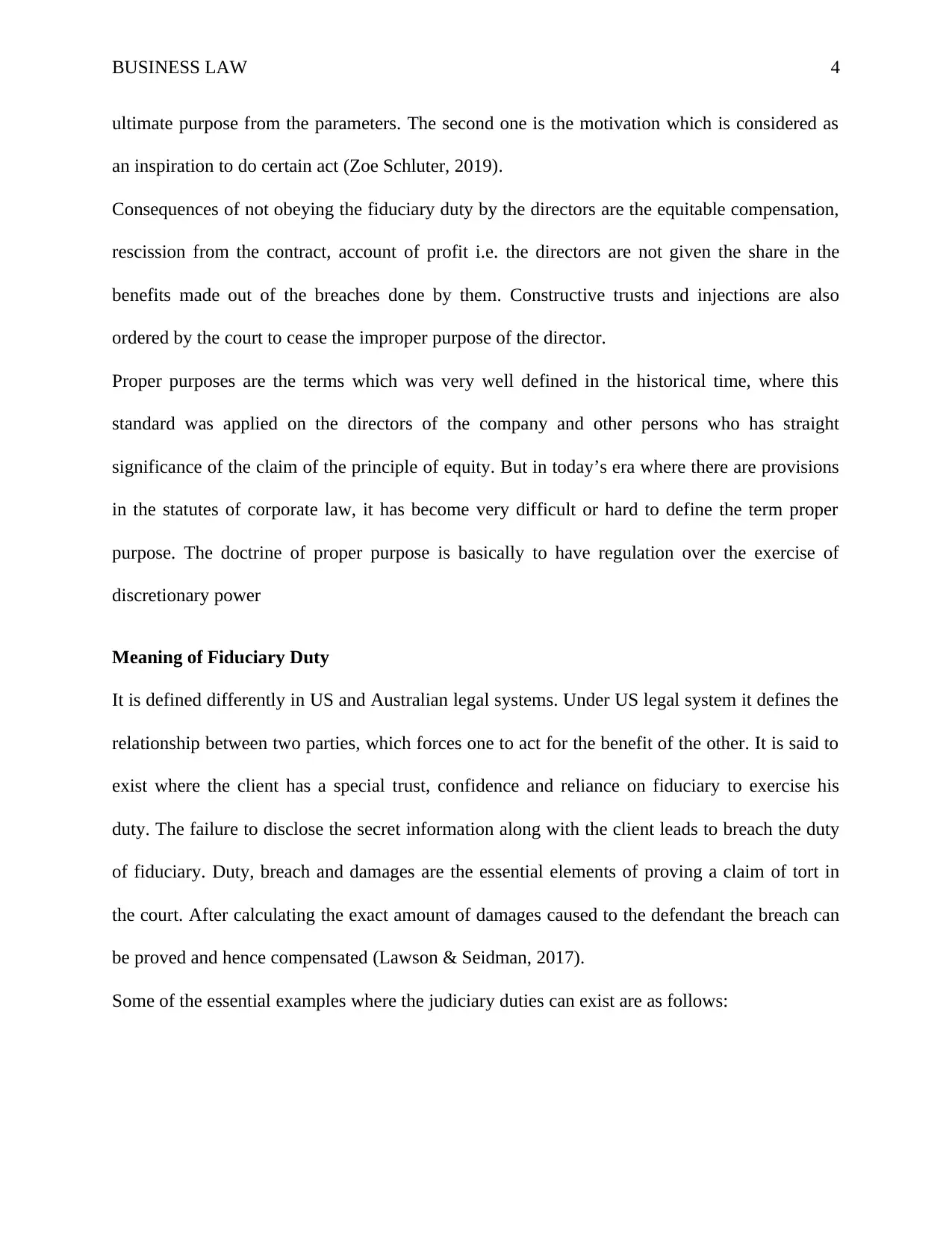
BUSINESS LAW 4
ultimate purpose from the parameters. The second one is the motivation which is considered as
an inspiration to do certain act (Zoe Schluter, 2019).
Consequences of not obeying the fiduciary duty by the directors are the equitable compensation,
rescission from the contract, account of profit i.e. the directors are not given the share in the
benefits made out of the breaches done by them. Constructive trusts and injections are also
ordered by the court to cease the improper purpose of the director.
Proper purposes are the terms which was very well defined in the historical time, where this
standard was applied on the directors of the company and other persons who has straight
significance of the claim of the principle of equity. But in today’s era where there are provisions
in the statutes of corporate law, it has become very difficult or hard to define the term proper
purpose. The doctrine of proper purpose is basically to have regulation over the exercise of
discretionary power
Meaning of Fiduciary Duty
It is defined differently in US and Australian legal systems. Under US legal system it defines the
relationship between two parties, which forces one to act for the benefit of the other. It is said to
exist where the client has a special trust, confidence and reliance on fiduciary to exercise his
duty. The failure to disclose the secret information along with the client leads to breach the duty
of fiduciary. Duty, breach and damages are the essential elements of proving a claim of tort in
the court. After calculating the exact amount of damages caused to the defendant the breach can
be proved and hence compensated (Lawson & Seidman, 2017).
Some of the essential examples where the judiciary duties can exist are as follows:
ultimate purpose from the parameters. The second one is the motivation which is considered as
an inspiration to do certain act (Zoe Schluter, 2019).
Consequences of not obeying the fiduciary duty by the directors are the equitable compensation,
rescission from the contract, account of profit i.e. the directors are not given the share in the
benefits made out of the breaches done by them. Constructive trusts and injections are also
ordered by the court to cease the improper purpose of the director.
Proper purposes are the terms which was very well defined in the historical time, where this
standard was applied on the directors of the company and other persons who has straight
significance of the claim of the principle of equity. But in today’s era where there are provisions
in the statutes of corporate law, it has become very difficult or hard to define the term proper
purpose. The doctrine of proper purpose is basically to have regulation over the exercise of
discretionary power
Meaning of Fiduciary Duty
It is defined differently in US and Australian legal systems. Under US legal system it defines the
relationship between two parties, which forces one to act for the benefit of the other. It is said to
exist where the client has a special trust, confidence and reliance on fiduciary to exercise his
duty. The failure to disclose the secret information along with the client leads to breach the duty
of fiduciary. Duty, breach and damages are the essential elements of proving a claim of tort in
the court. After calculating the exact amount of damages caused to the defendant the breach can
be proved and hence compensated (Lawson & Seidman, 2017).
Some of the essential examples where the judiciary duties can exist are as follows:

BUSINESS LAW 5
Company directors to their company, to shareholders, partners to others in share formal
partnership, agents to their principles, trustee to beneficiaries, lawyers to client etc. (Dermansky,
2018).
Section 181 along with good faith and proper purpose
In accordance with the Corporation Act 2001 section 181 states that there a number of fiduciary
duties which are entitled upon the directors. There a number of companies which are established
for special purposes by the government of Queensland for working for the number of
departments. In order to carry the duties which are complying with the Corporation Act every
company appoints a director. Therefore the directors under the Corporation Act are required to
do their activities with good intention and for a specific purpose, care and diligence must be
reflected in their actions, improper use of information and position must be avoided at large and
lastly certain interest must be disclosed (Australia, 2002).
In the case of Handley JA in Brunninghausen v Glavanics, (1999) 46 NSWLR 538.it was
determined by the appealing court that better intention and specific purpose are two principles
that are enough to take up a healthy decision for the betterment of the company. Sec 181
determines the importance of directors to commit their obligation with good intention and for a
specific purpose (CeRDI, 2019).
A civil duty is made obligatory on the directors, secretaries and all other officers working within
a corporation under section 181 of the Act to tool up with their authorities and release their
obligations with very adequate intention and for the interest of the company and for a proper
purpose (Australia, 2011). The best example of the situation is that use of power by the director
for their own-interest or benefit other than that for the betterment of the corporation as a whole
or of third party. Self-interest forgetting about the others may lead to breach of duty, reckless or
Company directors to their company, to shareholders, partners to others in share formal
partnership, agents to their principles, trustee to beneficiaries, lawyers to client etc. (Dermansky,
2018).
Section 181 along with good faith and proper purpose
In accordance with the Corporation Act 2001 section 181 states that there a number of fiduciary
duties which are entitled upon the directors. There a number of companies which are established
for special purposes by the government of Queensland for working for the number of
departments. In order to carry the duties which are complying with the Corporation Act every
company appoints a director. Therefore the directors under the Corporation Act are required to
do their activities with good intention and for a specific purpose, care and diligence must be
reflected in their actions, improper use of information and position must be avoided at large and
lastly certain interest must be disclosed (Australia, 2002).
In the case of Handley JA in Brunninghausen v Glavanics, (1999) 46 NSWLR 538.it was
determined by the appealing court that better intention and specific purpose are two principles
that are enough to take up a healthy decision for the betterment of the company. Sec 181
determines the importance of directors to commit their obligation with good intention and for a
specific purpose (CeRDI, 2019).
A civil duty is made obligatory on the directors, secretaries and all other officers working within
a corporation under section 181 of the Act to tool up with their authorities and release their
obligations with very adequate intention and for the interest of the company and for a proper
purpose (Australia, 2011). The best example of the situation is that use of power by the director
for their own-interest or benefit other than that for the betterment of the corporation as a whole
or of third party. Self-interest forgetting about the others may lead to breach of duty, reckless or
⊘ This is a preview!⊘
Do you want full access?
Subscribe today to unlock all pages.

Trusted by 1+ million students worldwide
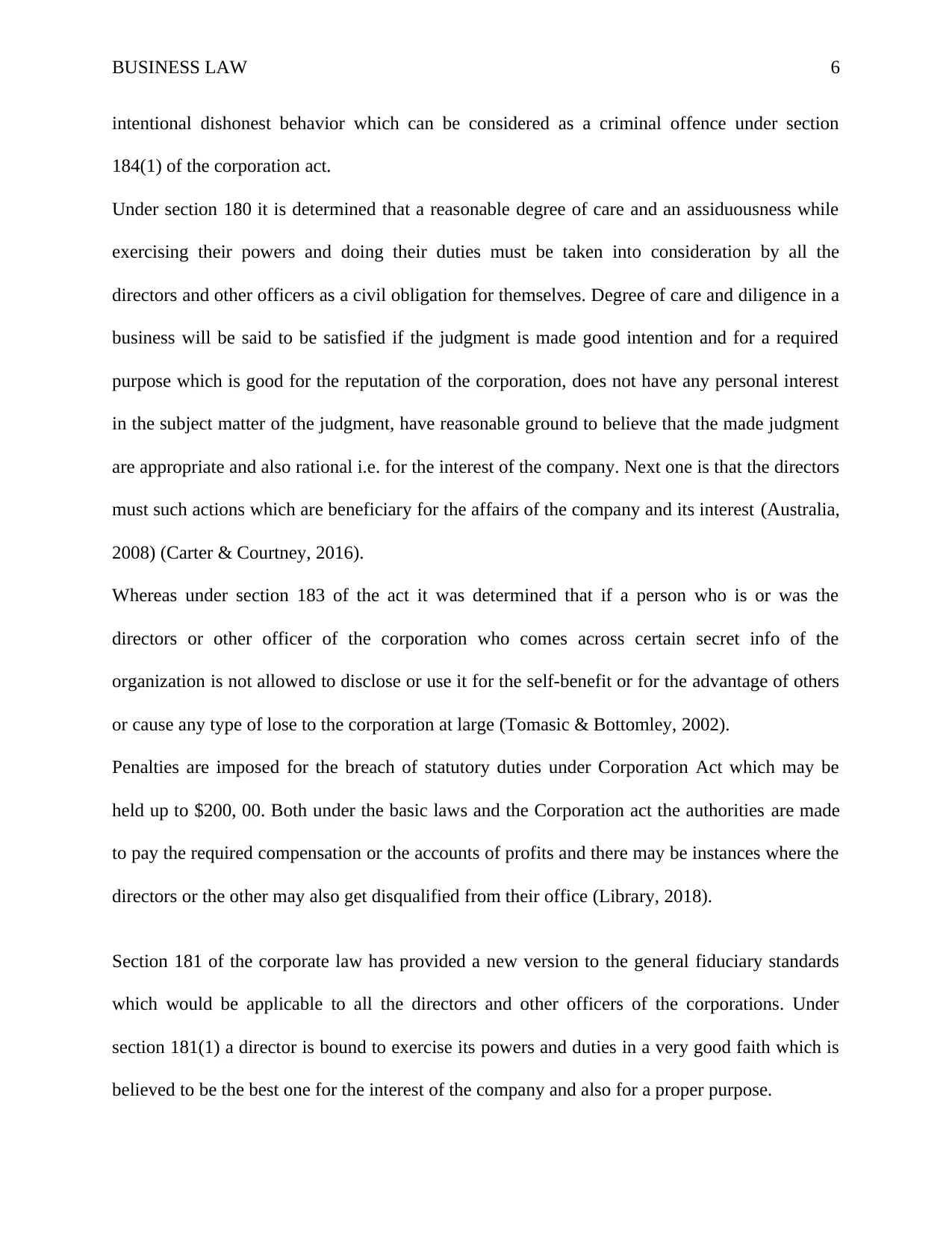
BUSINESS LAW 6
intentional dishonest behavior which can be considered as a criminal offence under section
184(1) of the corporation act.
Under section 180 it is determined that a reasonable degree of care and an assiduousness while
exercising their powers and doing their duties must be taken into consideration by all the
directors and other officers as a civil obligation for themselves. Degree of care and diligence in a
business will be said to be satisfied if the judgment is made good intention and for a required
purpose which is good for the reputation of the corporation, does not have any personal interest
in the subject matter of the judgment, have reasonable ground to believe that the made judgment
are appropriate and also rational i.e. for the interest of the company. Next one is that the directors
must such actions which are beneficiary for the affairs of the company and its interest (Australia,
2008) (Carter & Courtney, 2016).
Whereas under section 183 of the act it was determined that if a person who is or was the
directors or other officer of the corporation who comes across certain secret info of the
organization is not allowed to disclose or use it for the self-benefit or for the advantage of others
or cause any type of lose to the corporation at large (Tomasic & Bottomley, 2002).
Penalties are imposed for the breach of statutory duties under Corporation Act which may be
held up to $200, 00. Both under the basic laws and the Corporation act the authorities are made
to pay the required compensation or the accounts of profits and there may be instances where the
directors or the other may also get disqualified from their office (Library, 2018).
Section 181 of the corporate law has provided a new version to the general fiduciary standards
which would be applicable to all the directors and other officers of the corporations. Under
section 181(1) a director is bound to exercise its powers and duties in a very good faith which is
believed to be the best one for the interest of the company and also for a proper purpose.
intentional dishonest behavior which can be considered as a criminal offence under section
184(1) of the corporation act.
Under section 180 it is determined that a reasonable degree of care and an assiduousness while
exercising their powers and doing their duties must be taken into consideration by all the
directors and other officers as a civil obligation for themselves. Degree of care and diligence in a
business will be said to be satisfied if the judgment is made good intention and for a required
purpose which is good for the reputation of the corporation, does not have any personal interest
in the subject matter of the judgment, have reasonable ground to believe that the made judgment
are appropriate and also rational i.e. for the interest of the company. Next one is that the directors
must such actions which are beneficiary for the affairs of the company and its interest (Australia,
2008) (Carter & Courtney, 2016).
Whereas under section 183 of the act it was determined that if a person who is or was the
directors or other officer of the corporation who comes across certain secret info of the
organization is not allowed to disclose or use it for the self-benefit or for the advantage of others
or cause any type of lose to the corporation at large (Tomasic & Bottomley, 2002).
Penalties are imposed for the breach of statutory duties under Corporation Act which may be
held up to $200, 00. Both under the basic laws and the Corporation act the authorities are made
to pay the required compensation or the accounts of profits and there may be instances where the
directors or the other may also get disqualified from their office (Library, 2018).
Section 181 of the corporate law has provided a new version to the general fiduciary standards
which would be applicable to all the directors and other officers of the corporations. Under
section 181(1) a director is bound to exercise its powers and duties in a very good faith which is
believed to be the best one for the interest of the company and also for a proper purpose.
Paraphrase This Document
Need a fresh take? Get an instant paraphrase of this document with our AI Paraphraser
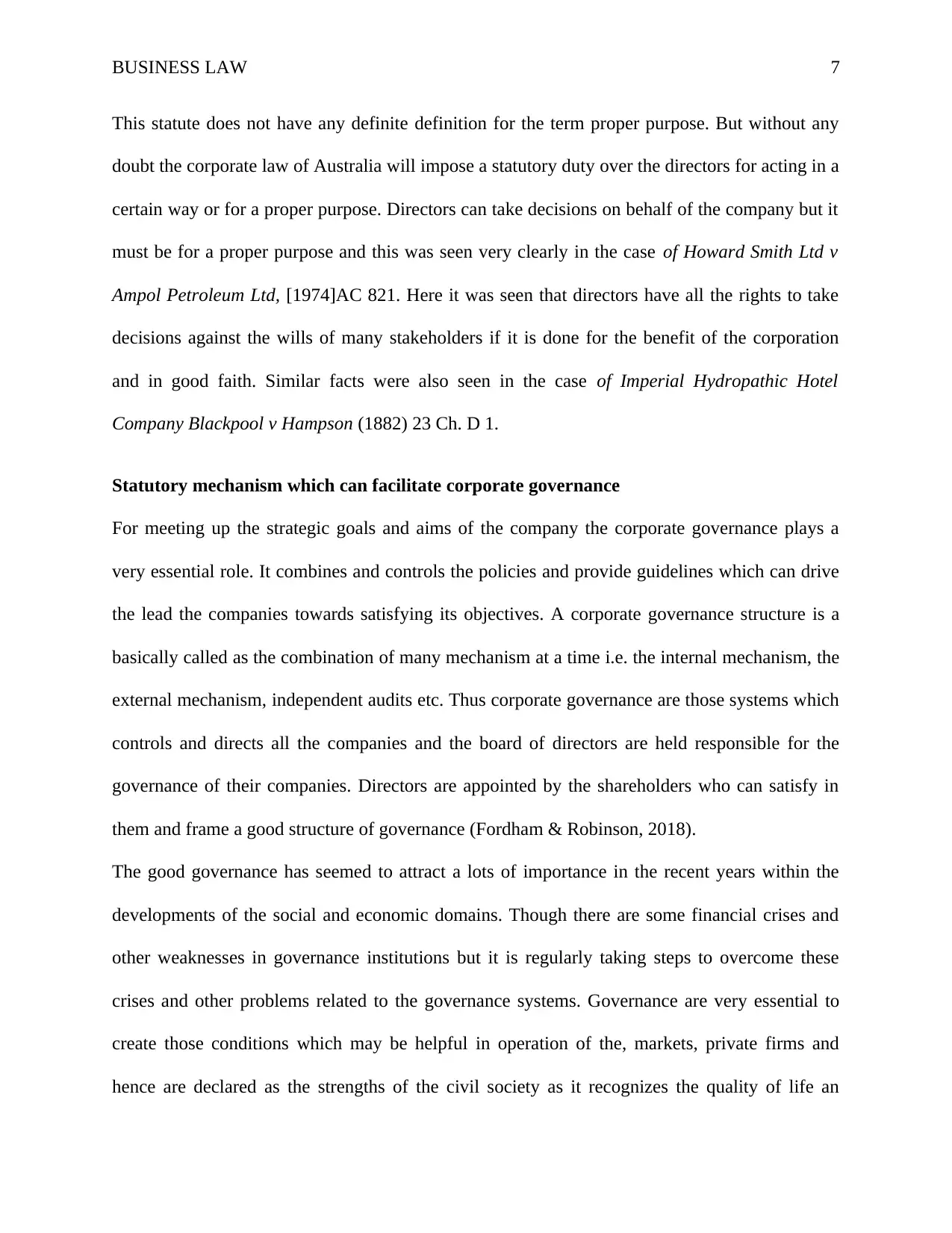
BUSINESS LAW 7
This statute does not have any definite definition for the term proper purpose. But without any
doubt the corporate law of Australia will impose a statutory duty over the directors for acting in a
certain way or for a proper purpose. Directors can take decisions on behalf of the company but it
must be for a proper purpose and this was seen very clearly in the case of Howard Smith Ltd v
Ampol Petroleum Ltd, [1974]AC 821. Here it was seen that directors have all the rights to take
decisions against the wills of many stakeholders if it is done for the benefit of the corporation
and in good faith. Similar facts were also seen in the case of Imperial Hydropathic Hotel
Company Blackpool v Hampson (1882) 23 Ch. D 1.
Statutory mechanism which can facilitate corporate governance
For meeting up the strategic goals and aims of the company the corporate governance plays a
very essential role. It combines and controls the policies and provide guidelines which can drive
the lead the companies towards satisfying its objectives. A corporate governance structure is a
basically called as the combination of many mechanism at a time i.e. the internal mechanism, the
external mechanism, independent audits etc. Thus corporate governance are those systems which
controls and directs all the companies and the board of directors are held responsible for the
governance of their companies. Directors are appointed by the shareholders who can satisfy in
them and frame a good structure of governance (Fordham & Robinson, 2018).
The good governance has seemed to attract a lots of importance in the recent years within the
developments of the social and economic domains. Though there are some financial crises and
other weaknesses in governance institutions but it is regularly taking steps to overcome these
crises and other problems related to the governance systems. Governance are very essential to
create those conditions which may be helpful in operation of the, markets, private firms and
hence are declared as the strengths of the civil society as it recognizes the quality of life an
This statute does not have any definite definition for the term proper purpose. But without any
doubt the corporate law of Australia will impose a statutory duty over the directors for acting in a
certain way or for a proper purpose. Directors can take decisions on behalf of the company but it
must be for a proper purpose and this was seen very clearly in the case of Howard Smith Ltd v
Ampol Petroleum Ltd, [1974]AC 821. Here it was seen that directors have all the rights to take
decisions against the wills of many stakeholders if it is done for the benefit of the corporation
and in good faith. Similar facts were also seen in the case of Imperial Hydropathic Hotel
Company Blackpool v Hampson (1882) 23 Ch. D 1.
Statutory mechanism which can facilitate corporate governance
For meeting up the strategic goals and aims of the company the corporate governance plays a
very essential role. It combines and controls the policies and provide guidelines which can drive
the lead the companies towards satisfying its objectives. A corporate governance structure is a
basically called as the combination of many mechanism at a time i.e. the internal mechanism, the
external mechanism, independent audits etc. Thus corporate governance are those systems which
controls and directs all the companies and the board of directors are held responsible for the
governance of their companies. Directors are appointed by the shareholders who can satisfy in
them and frame a good structure of governance (Fordham & Robinson, 2018).
The good governance has seemed to attract a lots of importance in the recent years within the
developments of the social and economic domains. Though there are some financial crises and
other weaknesses in governance institutions but it is regularly taking steps to overcome these
crises and other problems related to the governance systems. Governance are very essential to
create those conditions which may be helpful in operation of the, markets, private firms and
hence are declared as the strengths of the civil society as it recognizes the quality of life an
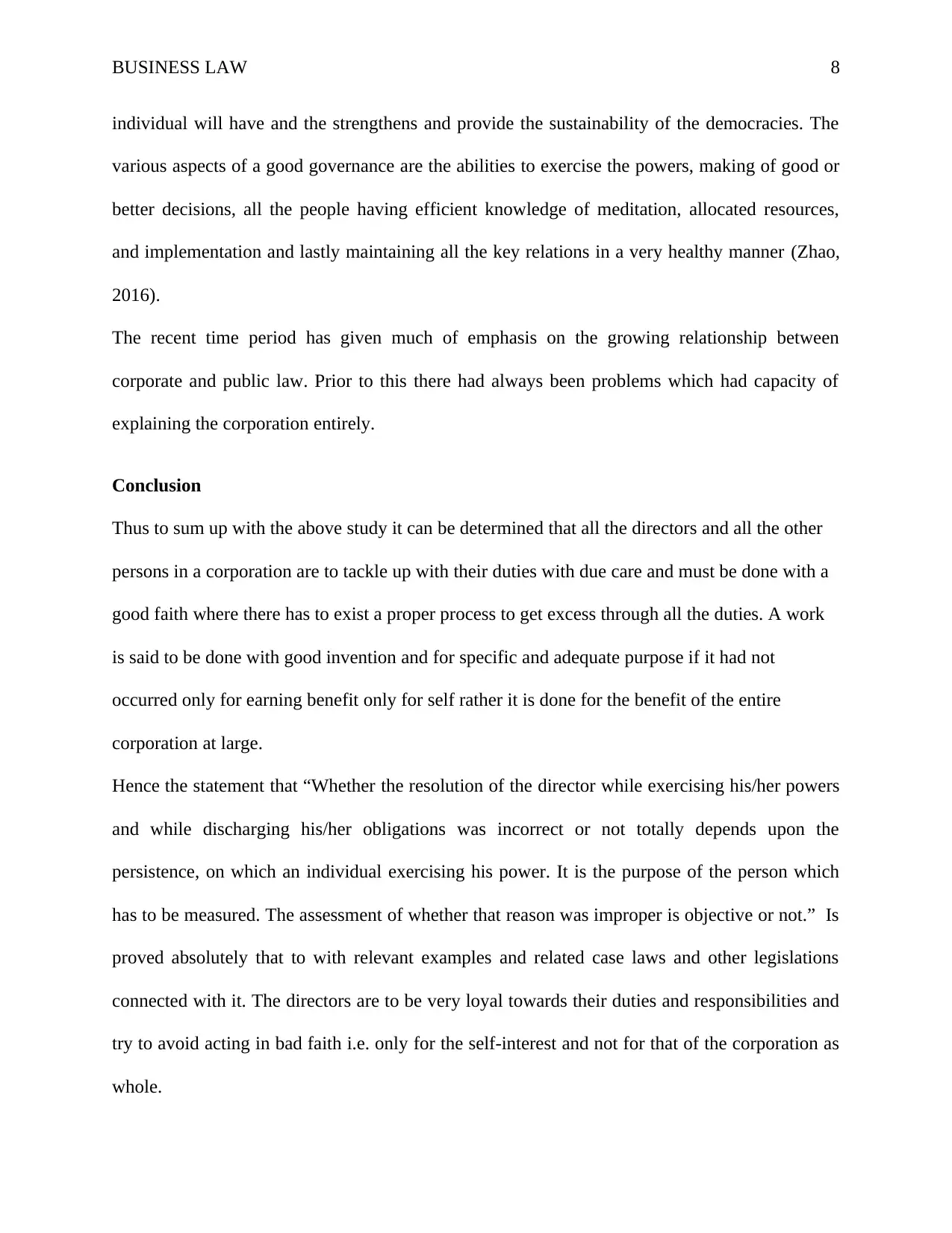
BUSINESS LAW 8
individual will have and the strengthens and provide the sustainability of the democracies. The
various aspects of a good governance are the abilities to exercise the powers, making of good or
better decisions, all the people having efficient knowledge of meditation, allocated resources,
and implementation and lastly maintaining all the key relations in a very healthy manner (Zhao,
2016).
The recent time period has given much of emphasis on the growing relationship between
corporate and public law. Prior to this there had always been problems which had capacity of
explaining the corporation entirely.
Conclusion
Thus to sum up with the above study it can be determined that all the directors and all the other
persons in a corporation are to tackle up with their duties with due care and must be done with a
good faith where there has to exist a proper process to get excess through all the duties. A work
is said to be done with good invention and for specific and adequate purpose if it had not
occurred only for earning benefit only for self rather it is done for the benefit of the entire
corporation at large.
Hence the statement that “Whether the resolution of the director while exercising his/her powers
and while discharging his/her obligations was incorrect or not totally depends upon the
persistence, on which an individual exercising his power. It is the purpose of the person which
has to be measured. The assessment of whether that reason was improper is objective or not.” Is
proved absolutely that to with relevant examples and related case laws and other legislations
connected with it. The directors are to be very loyal towards their duties and responsibilities and
try to avoid acting in bad faith i.e. only for the self-interest and not for that of the corporation as
whole.
individual will have and the strengthens and provide the sustainability of the democracies. The
various aspects of a good governance are the abilities to exercise the powers, making of good or
better decisions, all the people having efficient knowledge of meditation, allocated resources,
and implementation and lastly maintaining all the key relations in a very healthy manner (Zhao,
2016).
The recent time period has given much of emphasis on the growing relationship between
corporate and public law. Prior to this there had always been problems which had capacity of
explaining the corporation entirely.
Conclusion
Thus to sum up with the above study it can be determined that all the directors and all the other
persons in a corporation are to tackle up with their duties with due care and must be done with a
good faith where there has to exist a proper process to get excess through all the duties. A work
is said to be done with good invention and for specific and adequate purpose if it had not
occurred only for earning benefit only for self rather it is done for the benefit of the entire
corporation at large.
Hence the statement that “Whether the resolution of the director while exercising his/her powers
and while discharging his/her obligations was incorrect or not totally depends upon the
persistence, on which an individual exercising his power. It is the purpose of the person which
has to be measured. The assessment of whether that reason was improper is objective or not.” Is
proved absolutely that to with relevant examples and related case laws and other legislations
connected with it. The directors are to be very loyal towards their duties and responsibilities and
try to avoid acting in bad faith i.e. only for the self-interest and not for that of the corporation as
whole.
⊘ This is a preview!⊘
Do you want full access?
Subscribe today to unlock all pages.

Trusted by 1+ million students worldwide

BUSINESS LAW 9
Paraphrase This Document
Need a fresh take? Get an instant paraphrase of this document with our AI Paraphraser
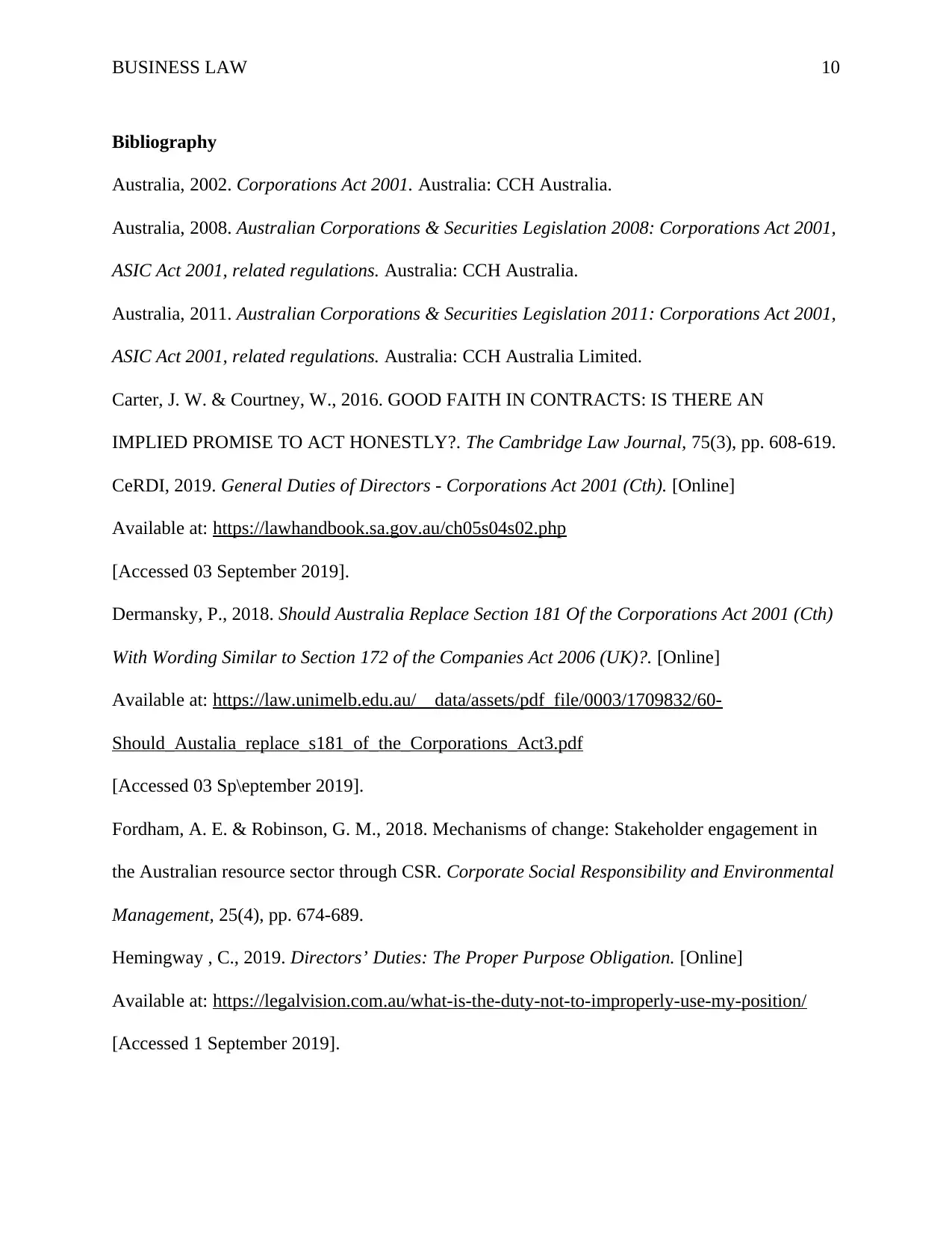
BUSINESS LAW 10
Bibliography
Australia, 2002. Corporations Act 2001. Australia: CCH Australia.
Australia, 2008. Australian Corporations & Securities Legislation 2008: Corporations Act 2001,
ASIC Act 2001, related regulations. Australia: CCH Australia.
Australia, 2011. Australian Corporations & Securities Legislation 2011: Corporations Act 2001,
ASIC Act 2001, related regulations. Australia: CCH Australia Limited.
Carter, J. W. & Courtney, W., 2016. GOOD FAITH IN CONTRACTS: IS THERE AN
IMPLIED PROMISE TO ACT HONESTLY?. The Cambridge Law Journal, 75(3), pp. 608-619.
CeRDI, 2019. General Duties of Directors - Corporations Act 2001 (Cth). [Online]
Available at: https://lawhandbook.sa.gov.au/ch05s04s02.php
[Accessed 03 September 2019].
Dermansky, P., 2018. Should Australia Replace Section 181 Of the Corporations Act 2001 (Cth)
With Wording Similar to Section 172 of the Companies Act 2006 (UK)?. [Online]
Available at: https://law.unimelb.edu.au/__data/assets/pdf_file/0003/1709832/60-
Should_Austalia_replace_s181_of_the_Corporations_Act3.pdf
[Accessed 03 Sp\eptember 2019].
Fordham, A. E. & Robinson, G. M., 2018. Mechanisms of change: Stakeholder engagement in
the Australian resource sector through CSR. Corporate Social Responsibility and Environmental
Management, 25(4), pp. 674-689.
Hemingway , C., 2019. Directors’ Duties: The Proper Purpose Obligation. [Online]
Available at: https://legalvision.com.au/what-is-the-duty-not-to-improperly-use-my-position/
[Accessed 1 September 2019].
Bibliography
Australia, 2002. Corporations Act 2001. Australia: CCH Australia.
Australia, 2008. Australian Corporations & Securities Legislation 2008: Corporations Act 2001,
ASIC Act 2001, related regulations. Australia: CCH Australia.
Australia, 2011. Australian Corporations & Securities Legislation 2011: Corporations Act 2001,
ASIC Act 2001, related regulations. Australia: CCH Australia Limited.
Carter, J. W. & Courtney, W., 2016. GOOD FAITH IN CONTRACTS: IS THERE AN
IMPLIED PROMISE TO ACT HONESTLY?. The Cambridge Law Journal, 75(3), pp. 608-619.
CeRDI, 2019. General Duties of Directors - Corporations Act 2001 (Cth). [Online]
Available at: https://lawhandbook.sa.gov.au/ch05s04s02.php
[Accessed 03 September 2019].
Dermansky, P., 2018. Should Australia Replace Section 181 Of the Corporations Act 2001 (Cth)
With Wording Similar to Section 172 of the Companies Act 2006 (UK)?. [Online]
Available at: https://law.unimelb.edu.au/__data/assets/pdf_file/0003/1709832/60-
Should_Austalia_replace_s181_of_the_Corporations_Act3.pdf
[Accessed 03 Sp\eptember 2019].
Fordham, A. E. & Robinson, G. M., 2018. Mechanisms of change: Stakeholder engagement in
the Australian resource sector through CSR. Corporate Social Responsibility and Environmental
Management, 25(4), pp. 674-689.
Hemingway , C., 2019. Directors’ Duties: The Proper Purpose Obligation. [Online]
Available at: https://legalvision.com.au/what-is-the-duty-not-to-improperly-use-my-position/
[Accessed 1 September 2019].
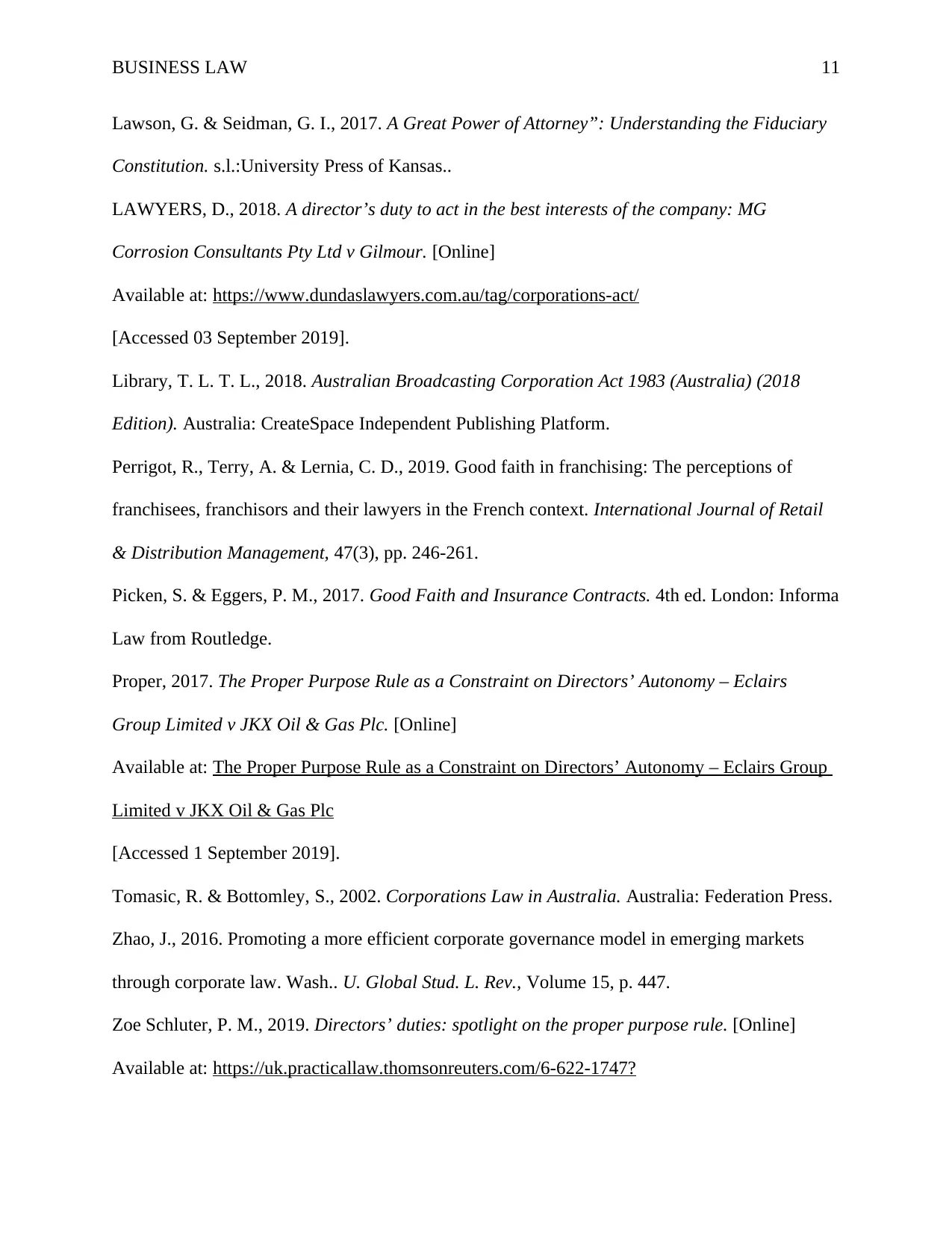
BUSINESS LAW 11
Lawson, G. & Seidman, G. I., 2017. A Great Power of Attorney”: Understanding the Fiduciary
Constitution. s.l.:University Press of Kansas..
LAWYERS, D., 2018. A director’s duty to act in the best interests of the company: MG
Corrosion Consultants Pty Ltd v Gilmour. [Online]
Available at: https://www.dundaslawyers.com.au/tag/corporations-act/
[Accessed 03 September 2019].
Library, T. L. T. L., 2018. Australian Broadcasting Corporation Act 1983 (Australia) (2018
Edition). Australia: CreateSpace Independent Publishing Platform.
Perrigot, R., Terry, A. & Lernia, C. D., 2019. Good faith in franchising: The perceptions of
franchisees, franchisors and their lawyers in the French context. International Journal of Retail
& Distribution Management, 47(3), pp. 246-261.
Picken, S. & Eggers, P. M., 2017. Good Faith and Insurance Contracts. 4th ed. London: Informa
Law from Routledge.
Proper, 2017. The Proper Purpose Rule as a Constraint on Directors’ Autonomy – Eclairs
Group Limited v JKX Oil & Gas Plc. [Online]
Available at: The Proper Purpose Rule as a Constraint on Directors’ Autonomy – Eclairs Group
Limited v JKX Oil & Gas Plc
[Accessed 1 September 2019].
Tomasic, R. & Bottomley, S., 2002. Corporations Law in Australia. Australia: Federation Press.
Zhao, J., 2016. Promoting a more efficient corporate governance model in emerging markets
through corporate law. Wash.. U. Global Stud. L. Rev., Volume 15, p. 447.
Zoe Schluter, P. M., 2019. Directors’ duties: spotlight on the proper purpose rule. [Online]
Available at: https://uk.practicallaw.thomsonreuters.com/6-622-1747?
Lawson, G. & Seidman, G. I., 2017. A Great Power of Attorney”: Understanding the Fiduciary
Constitution. s.l.:University Press of Kansas..
LAWYERS, D., 2018. A director’s duty to act in the best interests of the company: MG
Corrosion Consultants Pty Ltd v Gilmour. [Online]
Available at: https://www.dundaslawyers.com.au/tag/corporations-act/
[Accessed 03 September 2019].
Library, T. L. T. L., 2018. Australian Broadcasting Corporation Act 1983 (Australia) (2018
Edition). Australia: CreateSpace Independent Publishing Platform.
Perrigot, R., Terry, A. & Lernia, C. D., 2019. Good faith in franchising: The perceptions of
franchisees, franchisors and their lawyers in the French context. International Journal of Retail
& Distribution Management, 47(3), pp. 246-261.
Picken, S. & Eggers, P. M., 2017. Good Faith and Insurance Contracts. 4th ed. London: Informa
Law from Routledge.
Proper, 2017. The Proper Purpose Rule as a Constraint on Directors’ Autonomy – Eclairs
Group Limited v JKX Oil & Gas Plc. [Online]
Available at: The Proper Purpose Rule as a Constraint on Directors’ Autonomy – Eclairs Group
Limited v JKX Oil & Gas Plc
[Accessed 1 September 2019].
Tomasic, R. & Bottomley, S., 2002. Corporations Law in Australia. Australia: Federation Press.
Zhao, J., 2016. Promoting a more efficient corporate governance model in emerging markets
through corporate law. Wash.. U. Global Stud. L. Rev., Volume 15, p. 447.
Zoe Schluter, P. M., 2019. Directors’ duties: spotlight on the proper purpose rule. [Online]
Available at: https://uk.practicallaw.thomsonreuters.com/6-622-1747?
⊘ This is a preview!⊘
Do you want full access?
Subscribe today to unlock all pages.

Trusted by 1+ million students worldwide
1 out of 13
Related Documents
Your All-in-One AI-Powered Toolkit for Academic Success.
+13062052269
info@desklib.com
Available 24*7 on WhatsApp / Email
![[object Object]](/_next/static/media/star-bottom.7253800d.svg)
Unlock your academic potential
Copyright © 2020–2026 A2Z Services. All Rights Reserved. Developed and managed by ZUCOL.




